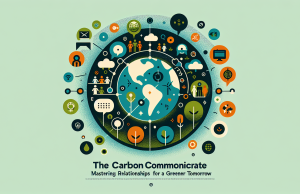In a world where the wheels of industry and innovation spin ever faster, businesses are perpetually on the brink of the next big transformation. The pursuit of progress often means adopting new technologies, restructuring organizations, and redefining industry norms. Yet, as corporations race against the clock and each other, there’s an ever-present scale that must be balanced: the one between unyielding progress and unwavering sustainability. This delicate equilibrium is not just about protecting our planet—it’s about ensuring a future where business thrives in harmony with the environment and society.
At the heart of this balancing act is the question of how companies can undergo the necessary rapid transformations without sidelining their sustainability and ethical responsibilities. This challenge is complex and multifaceted, demanding a strategic approach that embeds environmental values deep within the corporate culture.
## Case Studies of Success
The business landscape is dotted with shining examples of companies that have managed to reinvent themselves without sacrificing their green ethos. These case studies serve as a beacon, guiding others on the path of responsible change. One such example is a technology giant that restructured its supply chain to reduce emissions. By investing in renewable energy and committing to sustainable sourcing, the company not only lessened its environmental impact but also cut costs and boosted its brand image—a win-win for the business and the planet.
Another example is a multinational corporation that turned the tide by embracing circular economy principles. Through product redesign, waste reduction, and the development of new business models focused on product life extension, the company not only reduced its ecological footprint but also opened up new markets and revenue streams.
## Cultural Shifts in the Workplace
The journey towards sustainability begins with a cultural shift in the workplace. It’s about nurturing an environment where employees from top to bottom are not only aware of sustainability issues but are also empowered to make decisions that align with those values. Leadership plays a pivotal role in this transition. By setting clear sustainability goals and leading by example, leaders can foster an atmosphere where progress does not eclipse responsibility.
It is in such cultures that innovative solutions to sustainability challenges are born. Employees become advocates for change, driving efficiencies that benefit both the company and the environment. From implementing energy-saving measures to advocating for supplier diversity and ethical labor practices, every employee has a part to play.
## The Long-term Benefits
Companies that successfully balance sustainability with progress often discover that this alignment brings significant long-term benefits. Firms that commit to sustainable practices tend to see increased loyalty from customers and employees alike, better risk management, and enhanced investor confidence. Moreover, operating sustainably can open up new business opportunities and markets, particularly as consumers grow increasingly conscious of the environmental and social impact of their purchases.
## Future-Proofing Through Sustainable Strategies
So, what strategies can organizations adopt to prevent their pursuit of innovation and efficiency from undermining their ecological and social responsibilities? The answer lies in integrating sustainability into the core of business strategy, rather than treating it as a peripheral concern. It involves:
– Conducting regular sustainability audits to identify areas for improvement.
– Investing in sustainable technologies and practices, even if the payoff isn’t immediate.
– Engaging with stakeholders — from customers to local communities — to align business practices with broader social and environmental goals.
– Ensuring transparency in reporting progress towards sustainability targets, thus holding the company accountable to its commitments.
## The Bigger Picture
These efforts are not just about individual companies but are integral to meeting global sustainability goals and initiatives. By sharing their successes and challenges, businesses contribute to a larger discourse on how to achieve a sustainable future for all.
The age of rapid corporate change is upon us, but it need not come at the expense of our planet or its inhabitants. The decisions companies make today will reverberate for generations to come. In balancing the scale of work between sustainability and progress, businesses do not just transform themselves; they help to transform the world. Are you ready to tip the scale in the right direction?




























